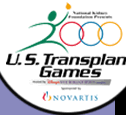|
 |
Back when she was still recovering from
surgery, during the worst of her hospital days, Wendy
was told by one of her doctors, somewhat jokingly, that
she better start training. The Transplant Games were
only months away. "Very funny," Wendy whispered. "Do
they have a talking competition? That's about all I'll
be able to do." And even that was by no means guaranteed.
|
So it was absolutely thrilling to watch Wendy drop another
double fault into the net, then smile. It was equally exciting
to watch her lose, then laugh about it, because she was
not at the Transplant Games to win. She was there to celebrate.
She was there to represent and promote what the transplant
community reverently calls the Gift of Life.
The Games did not draw a whole lot of coverage from the
television networks, and there were plenty of empty seats
in the stands. But to me this was the most meaningful sporting
event I have ever attended. Never before have I felt so
good about watching athletes compete. There was competition
in nine sports, and in several age groups, so there were
plenty of gold, silver, and bronze medals to go around.
There were some great athletic achievements. But those were
not the performances that kept playing in my mind. No, the
feats I would always remember were those that brought equal
doses of cheers and tears.
There was little Timmy Gallagher of Belmont, Massachusetts,
a twelve-year-old with a new heart beating in his chest,
leading most of the way in a 50-meter-dash, then falling,
but still managing to flop across the finish line for third
place.
There was Stephanie Fraser of Burlington, Vermont, a twenty-eight-year-old
kidney recipient and winner of five medals, crossing the
finish line in the 1,500 meter race-walk, hand-in-hand with
another woman, co-winners on the track and in life.
There was Wayne Brinkman of Cincinnati, a liver recipient
who is legally blind, collecting swimming medals, including
a gold, and University of Louisville baskteball coach Denny
Crum presenting the medals, all choked up, along with everybody
else in the place.
Then, of course, there was Wendy. She lost to the woman
who ended up winning the gold in tennis. But despite the
lack of a talking competition, Wendy actually won a medal,
the silver, in a 5-kilometer road race. "Pretty amazing,"
Carl said after watching her cross the finish line.
Soon he was reflecting on the entire experience of the
Games. "So different than what I'm used to seeing and feeling,"
Carl said. "As professional athletes, we complain, scream,
kick our feet and everything because we're tired and we
hurt. We could all learn so much by watching the people
out here. They're so thrilled just to be alive, let alone
competing in sports. I've never seen such an incredible
zest for life."
Wendy continued lobbying for a talking competition in
the next Transplant Games. But I thought the best addition
would be a T-shirt contest -- an event to honor the best
shirts -- because there were some great ones at these inaugural
Games. One said: "Organ Donors Have Their Hearts in the
Right Place." Another said: "Captain Kidney." My favorite
was worn by Frank Nemeth of St. Louis, a heart recipient.
On the front was a diagram of a heart, in full color and
great detail. On the back, it said: "Frank's Used Parts."
Never before had it been so exciting to see used parts in
action.
Read more in Jeffrey's book It Gets Dark Sometimes:
My Sister's Fight to Live and Save Lives, at www.transplantbook.com.
|

